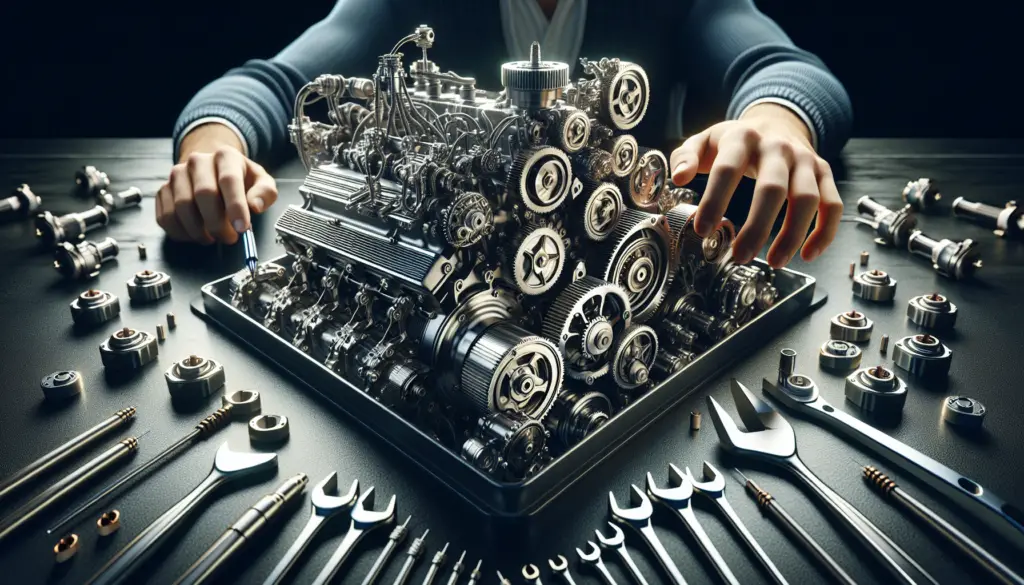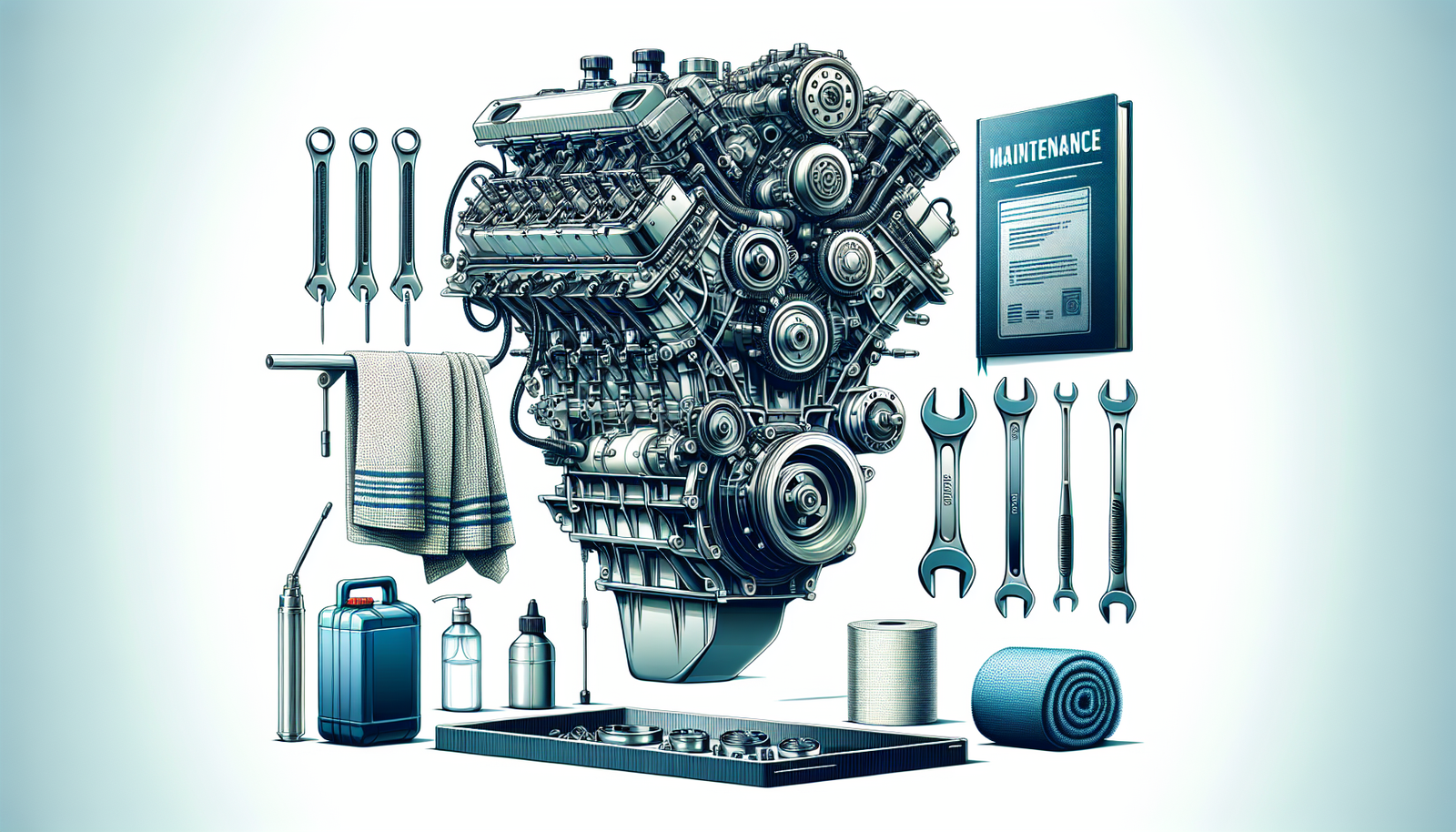In “Proper Boat Engine Maintenance For Optimized Performance,” you’re about to embark on an important journey to understand all the crucial aspects of maintaining a boat engine. You’ll learn valuable tips and tricks to ensure your boat engine runs smoothly and efficiently, providing you with optimum performance in every journey. Whether you’re a novice or an experienced sailor, this insightful article promises to boost your knowledge and enable you to keep your boat’s engine in peak condition. So sit back, relax, and get ready to unlock the secrets of effective boat engine maintenance for a bountiful boating experience.
Understanding the Importance of Boat Engine Maintenance
Being a boat owner, it’s critical for you to comprehend the significance of regular boat engine maintenance. It’s not only about keeping your vessel in good appearance or ensuring it operates smoothly on the waters. There’s far more to it than just that. Let’s delve deeper into the key benefits and risks correlated to boat engine maintenance.
Benefits of regular maintenance
Frequent and proper boat engine maintenance renders numerous benefits and guarantees optimized performance. It extends the life of your boat by preventing premature engine failure, reducing the probability of sudden and unexpected breakdowns. Regular check-ups can also enhance fuel efficiency, saving you a substantial amount of money in the long term. Moreover, it’ll increase your boat’s resale value, as well maintained engines are an attractive feature to potential buyers.
Risks of negligence to boat engine
Contrarily, neglecting your boat engine maintenance can have severe repercussions. Overlooking small issues can escalate into bigger ones, leading to costly repairs or even the need for complete engine replacement. Negligence can potentially make your boat unsafe, increasing the risk of accidents or breakdowns in the middle of waters. Indeed, failure to perform regular maintenance checks can not only take a toll on your wallet but also put you and your passengers’ lives in jeopardy.
Recognizing The Different Parts of A Boat Engine
Before embarking on maintenance routines, you need to familiarize yourself with the distinct components of a boat engine and their functions.
The internal combustion engine
The internal combustion engine represents the heart of your boat, transforming fuel into mechanical energy which propels your boat forward. It consists of several parts, including the cylinders, pistons, and spark plugs, each contributing to the overall performance of your vessel.
The propeller and transmission
The propeller and transmission take the energy produced by the engine and use it to move your boat in different directions. The transmission changes the engine’s output while the propeller translates the rotational power into thrust in the water.
The fuel system
This comprises components like fuel tank, fuel pump, fuel lines, and fuel filter. It’s responsible for providing the engine with necessary fuel and must be cautiously maintained to prevent risks such as leaks or contamination.
The cooling system
The cooling system plays a pivotal role in maintaining the engine’s temperature, effectively preventing overheating and engine failure. It consists primarily of the water pump, radiator, hoses, and coolant which work in sync to disperse heat away from the engine.

Routine Checks You Should Perform
To ensure your boat engine runs optimally and reliably, certain maintenance tasks should be performed on a regular basis.
Regular oil checks and changes
Like any engine, your boat engine requires clean and adequate oil to operate smoothly. Regular oil checks allow for monitoring oil level and quality, ensuring the engine stays lubricated and avoids any unnecessary friction. Moreover, oil changes should be performed regularly as per manufacturer’s recommendation, generally every 50 to 100 operating hours.
Checking the bilge for oil leaks
Checking the bilge not only involves inspecting for excess water but also for oil leaks which can be a tell-tale sign of engine problems. Oil in the bilge can come from a leaking engine or old spills not properly cleaned up. It’s crucial to handle and address any oil leaks promptly to prevent potential engine damage.
Inspecting the fuel system
The entire fuel system should be thoroughly checked for any leaks, damage, or contamination. Pay special attention to the fuel lines, filters, and tanks. The fuel should be fresh and clean, as old or contaminated fuel can adversely affect engine performance.
Monitoring the cooling system
Ensuring the cooling system is functioning efficiently is vital to prevent the engine from overheating. Periodically check the coolant level and consistency. Inspect the water pump, hoses, and belts for any signs of wear and tear.
Proper Cleaning Techniques for Different Engine Parts
Keeping your boat engine clean aids in extending its life and optimizing performance. Each engine part requires specific cleaning methods and products.
Cleaning methods for combustion engine
The combustion engine, being a crucial part of your boat, should be cleaned carefully using degreasers or specific boat engine cleaners. However, avoid spraying directly onto any electrical parts to prevent damage.
Cleaning the propeller and transmission system
Dirt, marine growth, or any debris stuck in the propeller can affect its rotation and the boat’s overall performance. Clean it using a brush and marine safe cleaning solution. For the transmission system, strictly follow the manufacturer’s guidelines to avoid causing any damage.
Proper cleaning of the fuel system
The fuel system, including the tank, lines, and filters, should be periodically cleaned to prevent contamination. Utilize special fuel system cleaners and additives that can eliminate buildup and improve fuel efficiency.
Tips on cleaning the cooling system
The cooling system needs a proper clean once in a while using special radiator flush solutions that can help remove any deposits or blockages. However, ensure that you replace the coolant and not just top it up after cleaning.

Inspection and Maintenance of the Fuel System
A well-maintained fuel system ensures your engine operates smoothly and efficiently.
Checking the fuel filter
Fuel filters protect the engine by filtering out any harmful debris or contaminants that might cause damage. Routinely check and change the fuel filters as per the boat manufacturer’s guidelines.
Regularly replacing the spark plugs
A spark plug’s role is essential in the combustion process, igniting the air-fuel mixture in the engine. Regular replacement of spark plugs guarantees optimal engine functionality.
Handling and storing fuel
Proper handling and storage of fuel can have a big impact on your boat engine’s performance. Always use a clean container for carrying and storing fuel, and avoid using fuel that’s been sitting for a long time as it can lead to contamination.
Detecting and addressing fuel leaks
Fuel leaks not only present a fire risk but can also cause serious damage to your engine. Regularly inspect the fuel lines, connections, and tank for any signs of leaking, corrosion or wear and tear. If detected, leaks should be promptly addressed.
Effective Management of The Cooling System
A functioning cooling system is crucial for maintaining the optimal operating temperature of the engine.
Understanding the role of the cooling system
The cooling system’s primary function is to maintain the engine’s temperature within the optimal operating range to prevent overheating. It does so by dispersing heat generated from the constant burning of fuel in the engine.
Testing the thermostat
Regularly testing the thermostat ensures it is opening and closing properly at the right temperature. A faulty thermostat can lead to the engine overheating or running too cool, which affects the engine’s performance.
Protecting your engine from overheating
Keeping the cooling system in prime condition will protect your engine from overheating. Routinely check and clean the system, and ensure the coolant level is adequate.
Replacing coolant regularly
Coolant not only keeps your engine cool but also inhibits rust and corrosion. It should be changed at regular intervals, usually every 2 to 5 years.
Essential Boat Engine Lubrication Practices
Proper lubrication of your boat engine is crucial to prevent friction between its moving parts.
Necessary lubrication points
Key lubrication points include the engine (with engine oil), transmission, gears and any other moving parts. Regularly lubricating these points can drastically extend their lifespan and improve your boat’s performance.
Choosing the right lubricants
Each part of your boat engine requires specific lubricants. Always consult the owner’s manual to make sure you are using the right ones.
Proper lubrication techniques
Proper lubrication involves not only choosing the right lubricants, but also applying them correctly. Each part needs a specific amount and should never be overlubricated as it can lead to leaks or other issues.
Frequency of lubrication
Frequency of lubricating various parts depends on your boat usage and the manufacturer’s guidelines. Heavy usage may require more frequent lubrication while light usage less, but regular lubrication should not be ignored regardless.
Dealing with Common Boat Engine Problems
Every boat owner will inevitably encounter some common boat engine issues.
Dealing with engine overheating
If your engine overheats, it’s generally due to an inefficient cooling system. Check for blocked passages, defective water pump, or low coolant level.
Troubleshooting poor performance or misfire
Poor engine performance or misfire can be a result of a plethora of problems, from contaminated fuel to a faulty spark plug.
Addressing fuel leaks promptly
Fuel leaks can cause severe damage to your boat engine if left unattended. Regular inspection, correct handling of fuel, and timely repairs can help prevent such leaks.
Managing engine noise or vibration
Unusual engine noise or excessive vibration could indicate wear and tear of engine parts or misalignment of the propeller shaft. Regular maintenance checks can help identify and address these issues promptly.
Winterizing Your Boat Engine
Winterizing your boat engine prepares it for the harsh winter months, thus preventing expensive repairs come spring.
Steps to prepare your engine for winter
Prepping your engine for winter involves steps like changing the oil, flushing the cooling system, and adding antifreeze. The fuel system should be thoroughly cleaned, and the battery disconnected and stored in a dry, cool place.
Importance of winterizing
The importance of winterizing can’t be understated. Not only does it prevent freeze damage, but it also ensures your boat is ready to hit the waters with minimal issues when spring comes.
Materials needed for winterizing
Winterizing your engine will require a few materials like fresh oil, antifreeze, fogging oil, fuel stabilizer, and storage seal in addition to basic hand tools.
Proper storage of your boat during winter
Store your boat in a sheltered and dry area free from the harsh winter elements. Using a good quality boat cover can protect your boat from grime and UV damage.
Professional Maintenance and When to Seek It
While you can perform basic maintenance tasks yourself, certain situations call for professional care.
Benefits of professional service
Professional technicians have the much-needed experience and skills to handle complex repairs and maintenance. They can diagnose and fix underlying problems efficiently and accurately.
When to consider professional maintenance
If you notice issues beyond your understanding or if the boat has been neglected for a long period, it’s worth seeking professional help. Also, a professional service is recommended at least once a year for a comprehensive inspection and maintenance.
Choosing a professional service
Select a professional service based on their reputation, experience, and expertise. It’s essential to choose a service familiar with your boat’s make and model.
Cost of professional boat engine maintenance
The cost can vary greatly depending on the extent of service required. However, spending on professional maintenance can save you from much pricier repair bills down the line by detecting and addressing problems early.
Boat engine maintenance might seem challenging but understanding the components and their functions can simplify the process considerably. Neglecting it is certainly not an option as the risks and costs of neglect far outweigh the effort and costs of regular maintenance. So, buckle up for routine checks, regular cleaning, careful lubrication, and timely professional help to keep your boat performing flawlessly on the gleaming waters!

